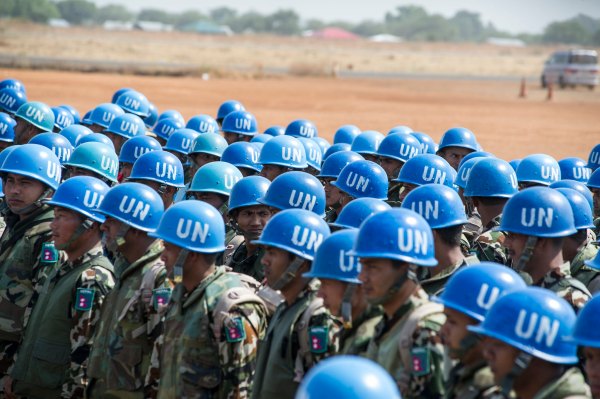By Emma Fawcett*

A group of peacekeepers from the UN Stabilization Mission in Haiti (MINUSTAH) prepare for departure from the island. / UN Photo / Isaac Billy / Flickr / Creative Commons
Haiti’s new president, Jovenel Moïse, has helped the country overcome the long political crisis that preceded his election, but he faces losing two long-running forms of support from the international community. MINUSTAH, the UN peacekeeping operation that has been in place for 13 years – successor to similar missions since 1994 – will depart this autumn, necessitating an expansion in Haiti’s domestic police force. The U.S. Temporary Protected Status (TPS) program, providing temporary legal residency to some 58,000 Haitians in the United States since the 2010 earthquake, appears likely to end in January 2018.
- MINUSTAH has long been the backbone of Haitian internal security, for which Haiti’s own forces lack competence and credibility. The UN’s demobilization began in May, when units from Chile, Uruguay, and Peru returned home. Brazilian units remain in the country to oversee the return of equipment and disassembly of base facilities. Operations will officially cease on October 15. MINUSTAH is one of the United Nation’s longest running peacekeeping missions, and its loss will have a significant impact even though its operations have been plagued by tragic (and criminal) missteps. It was responsible for bringing cholera to Haiti; the epidemic has since killed more than 10,000 people. In addition, an Associated Press investigation revealed nearly 2,000 accounts of sexual abuse and exploitation by UN peacekeepers, including about 300 perpetrated against minors. While the UN has a “zero tolerance” policy against sexual exploitation, it does not have the power to prosecute perpetrators – and holding troops accountable is the responsibility of their home governments. Sri Lanka has declined to investigate more than 100 of its soldiers, who were sent home in 2007 after sexual abuse allegations.
- The Haitian government requested an 18-month extension to the TPS program, but U.S. Secretary of Homeland Security John F. Kelly opted to extend by just six months. While Kelly said the program will be reevaluated before the current extension expires, his statement has effectively signaled the end of the program, noting that the short extension “should allow Haitian TPS recipients … time to attain travel documents and make other necessary arrangements for their ultimate departure from the United States” and give the Haitian government time to prepare for their repatriation. The Haitian government has argued that it is ill equipped to manage an influx of returnees, and that the remittances provided by those in the TPS program are vital to Haiti’s continued recovery.
More than seven years after the deadly earthquake, Haiti’s recovery remains elusive, and the departure of MINUSTAH and potential end of the TPS program portend a rocky road ahead for a new government that is just barely getting some traction. The end of both forms of support for Haiti represent donor fatigue – not Haitian achievement of benchmarks of progress. Port-au-Prince couldn’t reasonably expect the UN to continue providing it security support for another 20 years, but Moïse is about to bear the brunt of series of predecessors who failed to prepare the nation for the UN’s departure. The support Haiti has received from the international community has always fallen short of promises; nearly $10 billion in pledges for post-earthquake assistance never materialized. But donors also point out that Haiti has often failed to uphold its end of the bargain; the protracted election crisis caused many to withdraw budgetary support. While both the UN peacekeeping mission and U.S. immigration policy have been at times poorly executed, their absence will be a major blow, if nothing else because changes on both fronts are proof that Haiti is no longer anyone’s priority. Moïse’s administration has much to tackle – bolstering the national police force and preparing for the arrival of potentially tens of thousands of TPS returnees without adequate resources for either task – while he addresses 14 percent inflation and a bloated civil service. Looking for homegrown solutions would be a huge challenge for any country, especially one struggling with as many fundamentals as Haiti.
May 31, 2017
* Emma Fawcett is an Adjunct Professorial Lecturer at American University and a monitoring and evaluation specialist with an international NGO. Her doctoral thesis focused on the political economy of tourism and development in four Caribbean countries: Haiti, Dominican Republic, Cuba, and the Mexican Caribbean.
